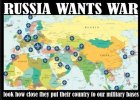Here is another analysis by Stratfor's George Friedman. While clearly pro-U.S., it is interesting to read, even if just to understand how the other side might see the long-term implications of what is going on:
_http://www.stratfor.com/weekly/borderlands-new-strategic-landscape
I think what is missing in Friedman's analysis (as usual) is the possibility of economic chaos, as well as the impact of Earth changes. Reading his analysis, it sounds like all is hunky-dory when in fact the whole financial system is hardly able to survive in its current form much longer.
The first and second world wars were about the status of Germany in Europe. That was what the Cold War was about as well, although framed in a different way. We are once again discussing the status of Germany. Today it has no western threat. The eastern threat is weak, far away and potentially more of an ally than a threat. The force that drove Germany in two world wars is not there now. Logically, it has little reason to take risks.
The American fear of a Eurasian hegemon is also a distant one. Russia is far from being able to pose that kind of threat. It is still struggling to regain its buffers. Just as Germany is not prepared to engage in aggressive actions, the United States will continue its century-old strategy of limiting its exposure for as long as possible. At the same time, the buffer countries face a potential threat that prudence requires they prepare for.
However, it is not clear that the Russian threat will materialize, and it is not clear that, rhetoric aside, the Russians have the political will to act decisively. The buffer states' optimal solution would be a massive NATO intervention. That won't happen. The second best would be a massive American intervention. That won't happen either. The buffer states want to shift the cost of their defense to others -- a rational strategy if they can achieve it.
The impersonal forces of geopolitics are driving Russia to try to retake its critical borderland. Having done that, the nations bordering Russian power will not know how far the Russians will try to go. For Russia, the deeper the buffer, the better. But the deeper the buffer, the higher the cost of maintaining it. The Russians are not ready for any such move. But over time, as their strength and confidence grow, their actions become less predictable. When facing a potential existential threat, the prudent action is to overreact.
The buffer states need to arm and ally. The United States will provide a degree of support, regardless of what the Germans, and therefore NATO, do. But the basic decision is in the hands of the Poles, Slovaks, Hungarians, Romanians, Serbians and Azerbaijanis, along with those in the other buffer states. Some, like Azerbaijan, have already made the decision to arm and are looking for an alliance. Some, like Hungary, are watching and waiting. Mark Twain is supposed to have said, "History does not repeat itself, but it does rhyme." There is a rhyme that we can hear. It is in its early stages and few are yet locked into a course as Germany was in 1914. The forces are beginning to gather, and if they do, they will not be controlled by good will.
_http://www.stratfor.com/weekly/borderlands-new-strategic-landscape
I think what is missing in Friedman's analysis (as usual) is the possibility of economic chaos, as well as the impact of Earth changes. Reading his analysis, it sounds like all is hunky-dory when in fact the whole financial system is hardly able to survive in its current form much longer.









